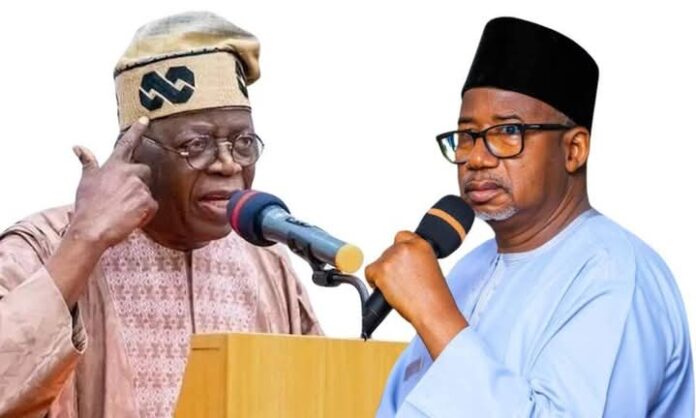By: Daure David
In the complex landscape of Nigerian politics, where personal ambition often intertwines with national interest, the remarks of political leaders are frequently scrutinized. One such leader whose actions have recently come under scrutiny is Governor Bala Mohammed of Bauchi State, especially following his criticisms of President Bola Ahmed Tinubu. Some analysts suggest that these critiques could be driven by personal political ambitions, particularly regarding a possible presidential run in 2027. However, it is crucial to approach Governor Mohammed’s statements from a broader perspective—one that emphasizes his patriotism and commitment to the welfare of Nigeria, rather than personal gain.
A Question of Patriotism
Governor Bala Mohammed’s criticisms of President Tinubu, particularly regarding the proposed Tax Reform Bill, must be seen within the context of his leadership philosophy and his dedication to the people he serves. While some may view his remarks through a political lens, questioning whether they are motivated by a desire for power, it is clear that his objections stem from a deep concern for the ordinary Nigerian citizen.
Throughout his tenure as governor, Bala Mohammed has consistently prioritized the development of Bauchi State. His administration has focused on improving infrastructure, enhancing education, and addressing security challenges at the grassroots level. His criticisms of national policies reflect a genuine concern that some of the federal government’s decisions, particularly the tax reforms, may not align with the needs of Nigeria’s most vulnerable citizens.
For Governor Mohammed, leadership is not about advancing personal ambitions but about ensuring that policies and decisions serve the people. His criticisms are an extension of his broader belief in good governance, accountability, and the prioritization of national welfare over party politics.
His Qualifications for Higher Office
It is important to recognize that Governor Bala Mohammed is a well-qualified leader, capable of contesting for the presidency if he chooses to do so. His extensive experience in government, particularly in public administration, positions him as a formidable candidate for any political office, including the presidency. However, to reduce his criticisms of President Tinubu to mere political posturing for the 2027 election would be to overlook the substance of his concerns.
Governor Mohammed’s focus has always been on pragmatic solutions to Nigeria’s most pressing challenges, including economic development, social justice, and security. His leadership record reflects a commitment to these issues, rather than personal political gain. Whether he chooses to run for president in 2027 or not, his current actions should be understood as part of his ongoing commitment to Nigeria’s future and his belief in the need for effective governance.
Defending the Rights of the Common People
One of the defining characteristics of Governor Bala Mohammed’s political career is his steadfast advocacy for the common people—the Nigerians who bear the brunt of poor governance, economic hardship, and unfulfilled promises. His strong defense of the rights and interests of these individuals often brings him into conflict with the political elite, particularly when he believes that national policies will hurt those who are already marginalized.
Governor Mohammed’s criticisms are not limited to policy disagreements but reflect his moral responsibility as a leader. By speaking out against decisions he believes are harmful to the people, he positions himself as a voice for those who may otherwise have no representation in the corridors of power. His stance underscores the idea that true leadership is not about political maneuvering, but about protecting and advocating for the welfare of the most vulnerable members of society.
The Bigger Picture
The most important aspect of Governor Bala Mohammed’s criticisms of President Tinubu is not the question of whether they are politically motivated but the larger issues they bring to the forefront. In a time of growing dissatisfaction with political leadership in Nigeria, his willingness to speak truth to power highlights the need for leaders who are more concerned with the nation’s welfare than with their own personal aspirations.
Governor Mohammed’s remarks challenge the political establishment to look beyond personal ambitions and address the real concerns facing Nigeria today—economic instability, insecurity, and widespread corruption. By calling attention to these issues, Governor Mohammed serves as a reminder that Nigeria’s leadership must be more than a means of securing power; it must be a tool for ensuring the well-being of the people, particularly those who are most in need.
Ultimately, Governor Bala Mohammed’s criticism of President Tinubu and the Tax Reform Bill should not be seen as a personal attack or as a play for political office. Rather, it should be viewed as an expression of his deep sense of duty to the people of Nigeria. His critique is grounded in his commitment to ensuring that the leadership of the country remains accountable to the needs of the citizens, rather than to the desires of political elites.
In the end, Governor Mohammed’s actions underscore the importance of leaders who are willing to put the welfare of their country above their own ambitions. Whether or not he chooses to pursue higher office in the future, his criticism is rooted in a genuine concern for Nigeria’s future and a call for more responsible, people-focused leadership. As Nigeria faces its many challenges, it is leaders like Governor Bala Mohammed who remind us that true patriotism means serving the people, not the pursuit of power.







